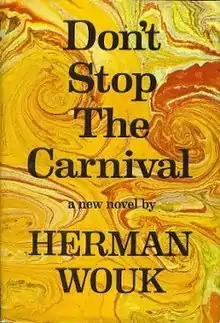Don't Stop the Carnival (novel)
Don't Stop the Carnival is a 1965 novel by American writer Herman Wouk. It is a comedy about escaping middle-age crisis to the Caribbean, a heaven that quickly turns into a hell for the main character. The novel was turned into a short-lived musical and later, album by Jimmy Buffett in 1997.
 First edition | |
| Author | Herman Wouk |
|---|---|
| Cover artist | Janet Gasson[1] |
| Country | United States |
| Language | English |
| Publisher | Doubleday |
Publication date | 1965 |
| Pages | 395 |
| OCLC | 25632993 |
Plot
Don't Stop the Carnival revolves around the lead character of Norman Paperman. He is the middle-aged New York City press agent who leaves the noise and safety of the big city and runs away to a (fictional) Caribbean island to redeem and reinvent himself as a hotel keeper. The result is a satirical tale of tropical disaster.[2]
The novel takes place on the fictional island of Amerigo. According to the opening of the musical (a paraphrased excerpt from the novel):
Kinja was the name of the island when it was British. The actual name was King George III Island, but the islanders shortened that to Kinja. Now the names in the maps and guidebooks is Amerigo, but everybody who lives there still calls it Kinja. The United States acquired the island peacefully in 1940 as part of the shuffling of old destroyers and Caribbean real estate that went on between Mr. Roosevelt and Mr. Churchill. The details of the transaction were, and are, vague to the inhabitants. The West Indian is not exactly hostile to change, but he's not much inclined to believe in it. Meantime, in a fashion, Amerigo was getting American-ized; the inflow of cash was making everybody more prosperous. Most Kinjans go along cheerily with this explosion of American energy in the Caribbean. To them, it seems a new, harmless, and apparently endless carnival.
Background
This book is based on Herman Wouk's experiences in the Virgin Islands in the early 1960s in Saint Thomas, U.S. Virgin Islands. The story centers around the fictional experiences of a New York advertising executive, not on Herman Wouk himself. The hotel referred to in the book was the Royal Mail Inn on Hassel Island, located in Charlotte Amalie Harbour. In this novel, Wouk relates stories of happenings, some perhaps fictional and actual, that he observed while living on St. Thomas, where the carnival never stops.
Adaptations
The novel was turned into a short-lived musical and later, album by Jimmy Buffett in 1997. Buffett refers to the development of the musical in his memoir of an aeronautical circumnavigation of the Caribbean shortly after his fiftieth birthday, A Pirate Looks at Fifty.
References